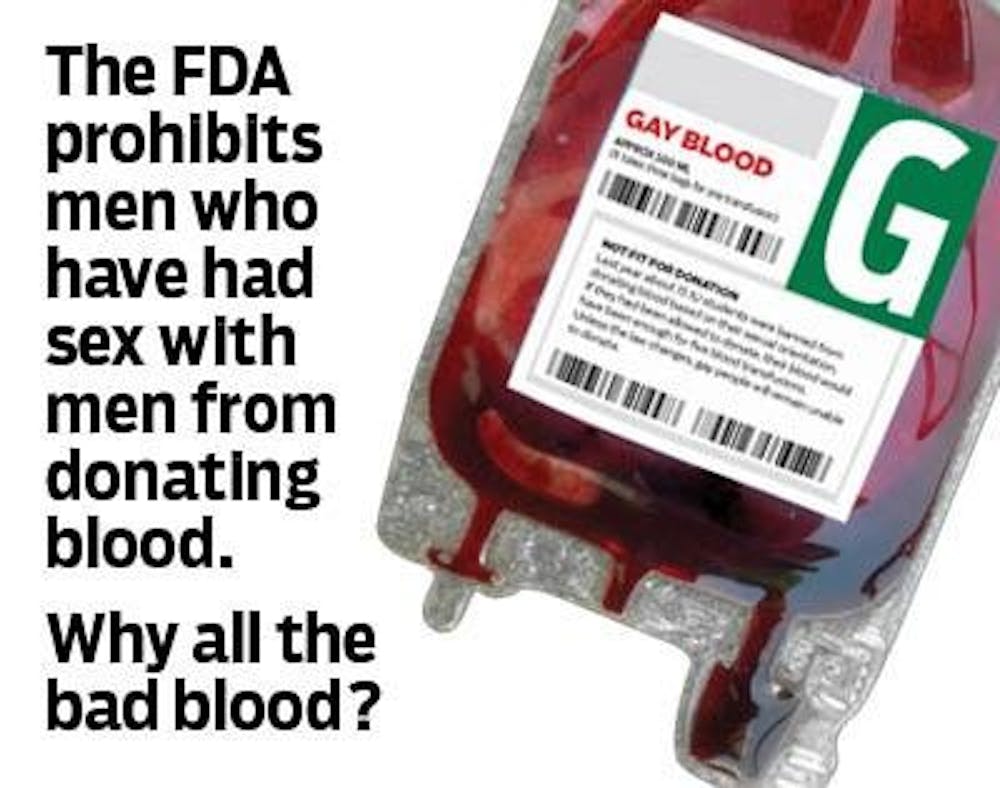Sam Laubach tried to donate blood once.
When the nurse asked him if he had ever had sex with another man any time after 1977, Laubach, president of Sigma Phi Beta, lied and said no.
He knew if he told the truth, he’d be deferred as a blood donor when he had perfectly clean blood to donate. However, a nurse who knew him prior had noticed him and called him out on his lie.
Laubach eventually told the truth and was then told he was ineligible to donate blood.
“I could tell it just really hurt him to tell me I couldn’t donate any blood. I could see it in his eyes,” Laubach said.
For the past 30 years, homosexual men have been banned from donating blood.
In 1983, the U.S. Food and Drug Administration implemented the MSM blood ban, which states that men who have had sex with other men any time since 1977 are ineligible to donate blood.
The ban also deems women who have had sex in the past 12 months with a man who has had sex with another man, even if only once, ineligible to donate blood.
The Secular Alliance at IU and Sigma Phi Beta fraternity are partnering with the Red Cross to sponsor their second Blood Drive for Equality to raise awareness about the MSM blood ban in the U.S. There will also be a petition to repeal the FDA’s policy on the MSM blood ban.
The blood drive is taking place from 10 a.m. to 3 p.m. in Georgian Room of the Indiana Memorial Union.
The blood drive comes just in time for the end of National Blood Donor Month.
During last year’s blood drive, the Secular Alliance and Sigma Phi Beta took a tally on a poster board as a visual representation of those who were ineligible because of this lifetime ban. About 15 people were unable to give blood due to the MSM blood ban.
Every two seconds, someone in the U.S. needs a blood transfusion, said Katy Maloy, program manager of communications at the American Red Cross, via email.
The average amount of blood taken when donating is one pint. The average amount of blood someone needs in a transfusion is three pints. Without the blood ban, ineligible donors would have been able to provide enough blood for five blood transfusions.
“This is a law based on scientific fear. We need more blood, and this is a ridiculous policy we don’t need,” said Jessika Griffin, Secular Alliance president. “It’s scientifically and medically unwarranted.”
According to the U.S. Food and Drug Administration site, “a history of male-to-male sex is associated with an increased risk for the presence of and transmission of certain infectious diseases, including HIV, the virus that causes AIDS.”
They also state that men who have sex with other men are 60 times more likely to have HIV than the general population.
According to the Indiana State Department of Health site, by the end of December 2010, there was a total of 9,893 people living with HIV/AIDS in Indiana. The majority infected were men who had sex with men.
Despite these statistics, there is still an urgency to change the policy. In 2010, Senate Democrats called on the U.S. Department of Health and Human Services to conduct a new study in order for the ban to be lifted.
“‘Healthy gay and bisexual men continue to be banned for life’ while ‘a man who has had sex with an HIV-positive woman’ can give blood after waiting only one year,” the Democrats said in a letter to HHS Secretary Kathleen Sebelius.
There’s also been action to help those afflicted by HIV/AIDS. The Obama administration released the National HIV/AIDS Strategy (NHAS) in July of 2010, which aimed to lower HIV infection by 25 percent. This past summer, the FDA approved of Truvada, the first drug to prevent HIV.
Although they are required by law to follow FDA guidelines in regards to the MSM blood ban, the Red Cross site says the group supports “rational, scientifically-based deferral periods that are applied fairly and consistently among donors who engage in similar risk activities.”
“The American Red Cross is disappointed that the FDA has chosen not to make changes ... to press for donor deferral policies that are fair, consistent and based on scientific evidence, while protecting patients from potential harm,” Maloy said.
This controversy can be dated back to 1984 when Ryan White, an Indiana teenager, contracted AIDS through a tainted hemophilia treatment. He was expelled from his middle school due to his condition, which turned him into the poster child for fighting AIDS-related discrimination.
During the years, AIDS-related discrimination has reoccurred sporadically. Before White, a major misconception in the U.S. was that only gay men contracted AIDS.
Most recent and relevant example of this discrimination occurred last July when IU professor Uri Horesh was arrested for protesting the MSM blood ban policy after being told he was ineligible to donate blood.
“It’s just nice people who want the opportunity to help ... It’s a heterosexist practice and it’s based more on stereotypes than actual fact,” Laubach said.
According to CNN, there was a nationwide shortage of blood donations last June.
“It’s important, we need more blood and we have an untapped resource. It just makes sense to repeal the blood ban,” Laubach said.
Students banned from donating blood

Get stories like this in your inbox
Subscribe





